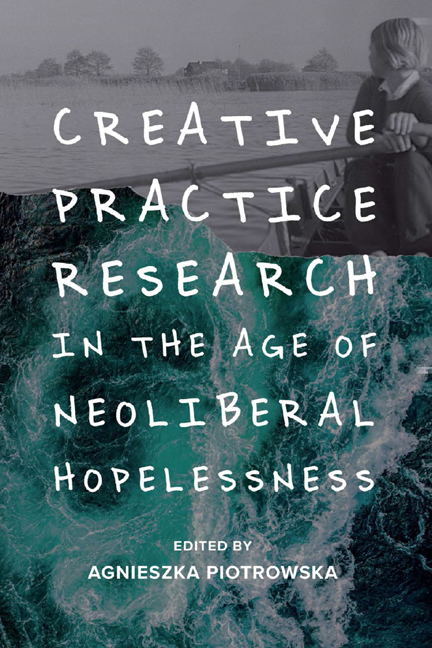Book contents
- Frontmatter
- Contents
- List of Figures
- Notes on Contributors
- Acknowledgements
- Preface: Life in the Post Pandemic Age
- Dedication
- 1 Introduction: Complexities, Compromises and Complicities
- 2 Against the Grain: Women Film Practitioners and Theorists Talk Creative Practice and Theory
- 3 Married to the Eiffel Tower: Notes on Love, Loss and Knowledge
- 4 Creativity and Neoliberalism: Between Autonomy, Resistance and Tactical Compliance
- 5 Tactical Compliance and the Persistence of Elsaesser
- 6 Storytelling and Game Playing
- 7 Autonomy and the Other Woman: Queer Active Agency and Postcolonial Expectations
- 8 From Neolithic to Neoliberal
- 9 First-person Expression on ‘Non-Western’ Screens: China as a Case Study
- 10 Scholarly Exploration of the Creative Process: Integrating Film Theory and Practice
- 11 Teaching Practice as Theory: Guerrilla Filmmaking
- 12 Baits of Falsehood: The Role of Fiction in Documentary or From Untheorised Practice to Unpractised Theory
- 13 Repented: A Creative Intersemiotic Translation
- Notes on Repented
- 14 How do you see me? The Camera as Transitional Object in Diasporic, Domestic Ethnography
- 15 ‘Shut Your Hole, Girlie. Mine's Making Money, Doll’: Creative Practice-Research and the Problem of Professionalism
- 16 Feminist ‘Pensive-creative Praxis’ and Irigaray: A Porous, Dialogical Encounter
- 17 The Paths of Creation, or How Can I Help my Dybbouk to Get Out of Me?
- 18 ‘We Want to Kill Boko Haram’: Reflections on the Photographic Representation of Children in a Displacement Camp
- 19 Between ‘Counter-movement’ (Ingold) and ‘Living with Ghosts’ (Demos)
- 20 Screen Memories: A Video Essay on Smultronstället/Wild Strawberries
- Index
9 - First-person Expression on ‘Non-Western’ Screens: China as a Case Study
Published online by Cambridge University Press: 17 October 2020
- Frontmatter
- Contents
- List of Figures
- Notes on Contributors
- Acknowledgements
- Preface: Life in the Post Pandemic Age
- Dedication
- 1 Introduction: Complexities, Compromises and Complicities
- 2 Against the Grain: Women Film Practitioners and Theorists Talk Creative Practice and Theory
- 3 Married to the Eiffel Tower: Notes on Love, Loss and Knowledge
- 4 Creativity and Neoliberalism: Between Autonomy, Resistance and Tactical Compliance
- 5 Tactical Compliance and the Persistence of Elsaesser
- 6 Storytelling and Game Playing
- 7 Autonomy and the Other Woman: Queer Active Agency and Postcolonial Expectations
- 8 From Neolithic to Neoliberal
- 9 First-person Expression on ‘Non-Western’ Screens: China as a Case Study
- 10 Scholarly Exploration of the Creative Process: Integrating Film Theory and Practice
- 11 Teaching Practice as Theory: Guerrilla Filmmaking
- 12 Baits of Falsehood: The Role of Fiction in Documentary or From Untheorised Practice to Unpractised Theory
- 13 Repented: A Creative Intersemiotic Translation
- Notes on Repented
- 14 How do you see me? The Camera as Transitional Object in Diasporic, Domestic Ethnography
- 15 ‘Shut Your Hole, Girlie. Mine's Making Money, Doll’: Creative Practice-Research and the Problem of Professionalism
- 16 Feminist ‘Pensive-creative Praxis’ and Irigaray: A Porous, Dialogical Encounter
- 17 The Paths of Creation, or How Can I Help my Dybbouk to Get Out of Me?
- 18 ‘We Want to Kill Boko Haram’: Reflections on the Photographic Representation of Children in a Displacement Camp
- 19 Between ‘Counter-movement’ (Ingold) and ‘Living with Ghosts’ (Demos)
- 20 Screen Memories: A Video Essay on Smultronstället/Wild Strawberries
- Index
Summary
This chapter was originally my keynote speech at NECS 2018 (European Network for Cinema and Media Studies) in Amsterdam. I feel tremendously grateful for the generous invitation from Professor Patricia Pisters and all committee members of the conference. As a filmmaker and a scholar working in cinema, I spend a large amount of time researching and practising cameramediated self-expression. As a vital force that shapes art and cultural practices, self-expression is also shown in diverse dispositions and forms. In different historical periods and geopolitical entities, individuals and collectives have been searching for methods of articulation and assertion. The individual self, situated in the complexity of social, cultural and cosmic relations, is not only shaped by its past, but is also constantly shaping the future self.
My last feature documentary China's van Goghs (2016) received its world premiere at International Documentary Film Festival Amsterdam, and consequently was theatrically released in the Netherlands, Italy, Japan, Hong Kong, etc.; it received many awards including Best Feature Documentary at the Beijing International Film Festival 2017 and at the Los Angeles Chinese Film Festival 2018, Netpac Award at the Moscow International Film Festival 2018, and the BAFTSS Practice Award in 2019. The film is an interdisciplinary work that interrogates art history and cultural sociology, asking if copying can be a path towards originality; it also reflects the dynamics of documentary production itself. An intimate portrait of peasant-turned-oil-painters transitioning from making copies of canonical masterpieces to creating their own original work of art, the film investigates self-expression on two levels. On the one hand, the making of this film allowed us to construct the first-person expression and desire of copy painters in Dafen Shenzhen, whose encounter with Van Gogh through the hundreds of hand-made copies not only provide them with financial means, but also inspire them to see the original and to create their own original work. On the other hand, the film reflects our own self-expression as the filmmakers, whose practices, just like the painters, are also shaped by transnational creative, economic and labour forces. Both self-expressions in painting and in filmmaking are linked by globalisation and internationalism, and involve constant negotiation with artistic, cultural and financial factors.
The understanding of multiple agents involved in shaping the production of painting in China's van Goghs probes me to rethink the possibilities of auteurism, which Astruc idealises in his concept of caméra-stylo (2002 [1948]).
- Type
- Chapter
- Information
- Creative Practice Research in the Age of Neoliberal Hopelessness , pp. 119 - 132Publisher: Edinburgh University PressPrint publication year: 2020



